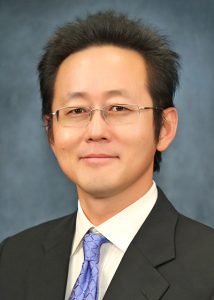Project Led by ECE Professor Receives Funding for Transistor Reliability Solution
July 12, 2023
Department of Electrical and Computer Engineering Associate Professor Seungdeog Choi is part of a team recently awarded over $100,000 from South Korea’s Ministry of Land, Infrastructure and Transport (MOLIT) through the Korea University of Technology and Education.

ECE Associate Professor Seungdeog Choi
Lead Principal Investigator Choi and the Korea University of Technology and Education’s J. Baek’s project is titled Development and Verification of Urban Hydrogen Mobility Diffusion Infrastructure Model Using Surplus Power in the City.
The funding will support developing a monitoring and lifetime prediction method for fuel cell processing in insulated-gate bipolar transistors (IGBT), which are power semiconductor switches used in urban rail vehicles.
“IGBT is a promising power semiconductor solution for high power, high frequency harsh energy system applications. However, its reliability has not been fully tested in modern power electronics systems,” Choi said.
For example, power switches in the emerging applications are increasingly subjected to dynamic and harsh operations, leading to condition changes in devices. Additionally, the harsh noise environment makes it challenging to accurately identify conditions, and the existing studies on health monitoring and remaining useful lifetime (RUL) estimation have limited scope.
Choi added, “To overcome this, state of the art requires an exhaustive number of samples and system memory. We seek for new solutions for such challenges.”
He said the project will utilize a novel AI/machine learning for the prediction of RUL of the IGBT’s reliability, overcoming the challenges that occur. The proposed method will fast-track the sudden changes in reliability, leading to accurate RUL estimation.
To learn more about Dr. Choi’s areas of interest, visit his ECE faculty page.
The Department of Electrical and Computer Engineering at Mississippi State University consists of 27 faculty members (including seven endowed professors), seven professional staff, and over 700 undergraduate and graduate students, with approximately 100 being at the Ph.D. level. With a research expenditure of over $14.24 million, the department houses the largest High Voltage Laboratory among North American universities.
